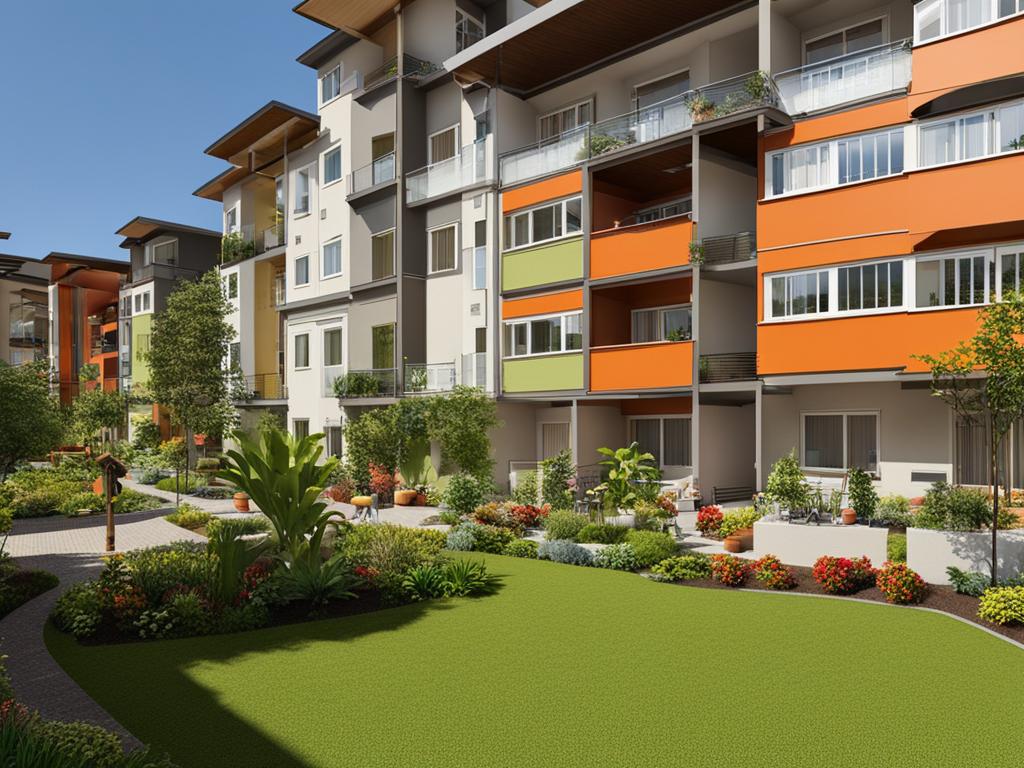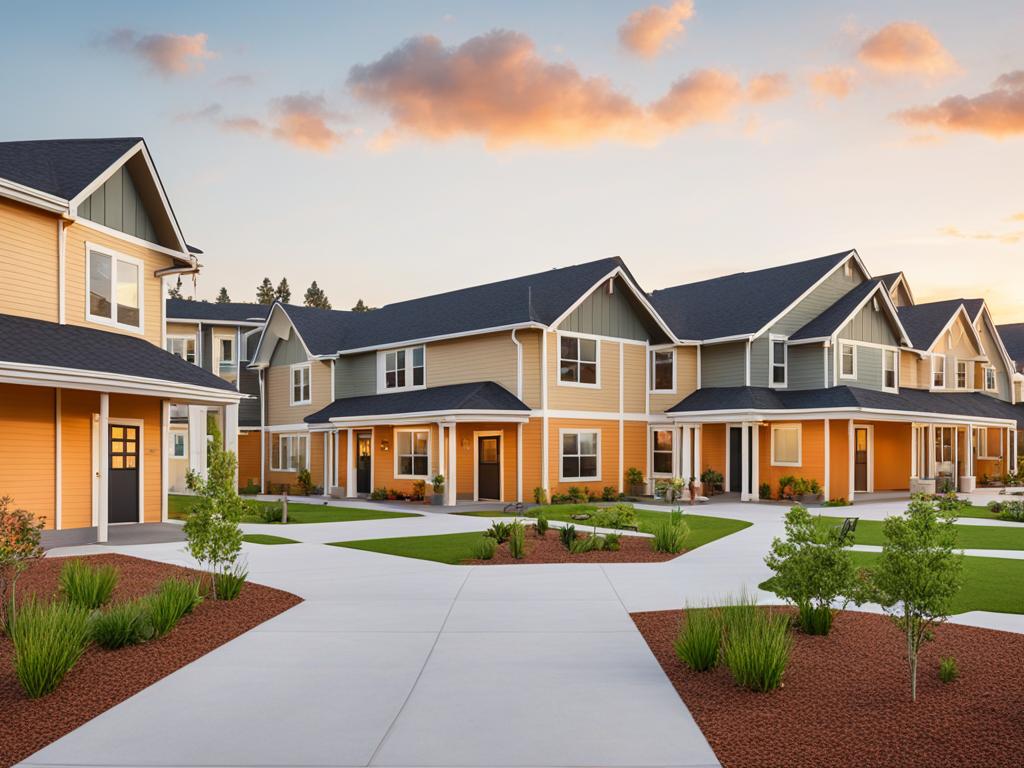Supportive Recovery Housing Solutions
Recovery housing can play a significant role in the recovery process for individuals struggling with addiction. Access to a supportive environment, with structure and accountability, can help individuals maintain lasting change, leading to sustained recovery. Transitional housing, residential recovery programs, and sober housing are some of the options available to individuals seeking supportive recovery housing solutions.
In this article, we will explore the different types of supportive recovery housing available, their benefits, and how to choose the right recovery housing option for sustained recovery. We will also discuss how recovery housing can help create a positive and supportive environment, common challenges faced, and how to overcome them.
Key takeaways:
- Recovery housing provides a supportive environment for individuals seeking lasting change in their lives.
- Transitional housing and residential recovery programs offer a structured environment, providing stability and support in the early stages of recovery.
- Choosing the right recovery housing option is essential for sustained recovery, considering factors such as location, cost, amenities, and program requirements.
- Creating a supportive environment is crucial for continued sobriety, and recovery housing can help create a positive and accountable community.
- Common challenges faced in recovery housing include relapse prevention, dealing with interpersonal conflicts and maintaining motivation towards long-term recovery.
Understanding Recovery Housing
Recovery housing provides a safe and supportive environment for individuals in addiction recovery. There are different types of recovery housing options available, each designed to meet specific needs.
Sober living homes offer a structured, substance-free living environment for those in recovery. Residents are expected to follow certain rules and maintain sobriety. These homes are designed to be a transitional step between treatment programs and independent living.
Halfway houses are similar to sober living homes, but are often used as an alternative to incarceration for individuals with substance abuse issues. Residents are required to follow strict rules and regulations.
Substance abuse housing is designed specifically for individuals with substance abuse issues. These homes provide 24/7 support and may offer group therapy, counseling, and other resources to promote long-term recovery.
Overall, recovery housing can be an integral part of addiction recovery. It offers a supportive environment with opportunities for personal growth and connection with others in recovery.
The Benefits of Transitional Housing
Transitional housing is an essential component in the journey towards recovery. It plays a vital role in providing individuals with stability, support, and a sense of community during their early recovery stages.
Supportive housing, such as transitional housing, offers residents a safe and structured environment that helps individuals transition from a treatment program to independent living. Recovery residences provide invaluable services such as therapy, counseling, and a supportive community, all of which promote the development of sober living skills.

Recovery residences allow individuals to build a strong foundation for long-term recovery. By surrounding themselves with similar individuals who share similar goals and struggles, residents can foster new friendships, learn healthy communication skills, and develop a sense of accountability.
Transitional housing provides a sense of stability and support, which can be a crucial aspect of recovery for many individuals. It offers a much-needed alternative to traditional housing options, which may not be conducive to maintaining sobriety. Recovery residences provide an environment free from drugs and alcohol, which is crucial in promoting a healthy and supportive recovery process.
If you or someone you know is struggling with addiction or in early recovery, transitional housing and recovery residences can be a significant resource for continued success in sobriety.
Residential Recovery Programs
Residential recovery programs are a powerful resource for individuals who are struggling with addiction. These programs offer a comprehensive approach to recovery that includes therapy, counseling, and community support. By providing a safe and structured environment away from triggers and negative influences, residential recovery programs can give individuals the foundation they need to achieve long-term sobriety.
One of the key benefits of residential recovery programs is the opportunity to engage in intensive therapy and counseling. By having access to individual and group therapy sessions, residents can address underlying issues that may be contributing to their addiction. Additionally, residential programs often include an array of evidence-based therapies such as cognitive-behavioral therapy, dialectical behavior therapy, and trauma-informed therapy.
Another crucial aspect of residential recovery programs is the support and guidance provided by a sober community. Living with others who are on a similar journey towards recovery can provide a sense of accountability, camaraderie, and mutual support that can be difficult to find elsewhere. Many residential recovery programs also offer opportunities for residents to participate in social activities, recreation, and educational workshops to build skills, confidence, and self-esteem.
Overall, residential recovery programs can be a highly effective way to jumpstart the healing process and overcome addiction. They offer a supportive and structured environment with access to various resources to help individuals achieve lasting recovery. If you or a loved one is struggling with addiction, consider exploring the many supportive recovery housing solutions, including residential recovery programs.
Choosing the Right Recovery Housing Option
Choosing the right recovery housing option is a critical decision for anyone seeking sustained recovery. When deciding on recovery housing, several factors should be considered to ensure it fits individuals’ specific needs and aligns with their recovery goals.
Location
Location is a crucial factor when choosing recovery housing. Consider proximity to work, school, outpatient treatment programs, and medical services. If staying closer to family and friends is important, make sure to factor that into the decision-making process.
Cost
Cost is another crucial factor in selecting recovery housing. Evaluate the costs of different housing options and determine what fits your budget. Be mindful that expensive doesn’t always mean better.
Amenities
Next, consider what amenities are important for your recovery journey. For example, some recovery housing options provide transportation, meals, and even fitness facilities. Consider what will make you feel most comfortable and supported.
Specific Program Requirements
When choosing recovery housing, it’s essential to consider specific program requirements and policies. For example, some programs may require residents to have completed a detox program, while others may have specific curfews or expectations regarding attendance at recovery meetings. Make sure to review and understand all program requirements before making a final decision.
Conducting Research and Making an Informed Decision
Once you have considered all relevant factors, it’s time to conduct research and make an informed decision. Reach out to the housing options you’re interested in, ask questions, and request a tour if possible. Don’t be afraid to advocate for yourself and ask for what you need to support your recovery journey.

Creating a Supportive Environment
Recovery housing, such as sober housing and halfway houses, can offer a supportive and accountable community for individuals seeking lasting sobriety. These housing options provide a safe and stable environment to build and reinforce healthy habits and coping skills.
In addition to recovery housing, there are other resources and strategies that individuals can use to create a positive recovery-focused environment. These may include:
- Attending support groups, such as Alcoholics Anonymous or Narcotics Anonymous
- Participating in therapy or counseling sessions
- Building a network of supportive friends and family members
- Engaging in healthy hobbies and activities
By utilizing these resources and strategies, individuals can establish a strong foundation for long-term recovery and prevent relapse.
“Surrounding yourself with positive influences and a supportive community can make all the difference in maintaining sobriety.”
Remember, building a supportive environment takes time and effort, but the rewards of sustained sobriety make it well worth it.
Overcoming Challenges in Recovery Housing
Transitioning to recovery housing can be challenging, but it is a necessary step in the journey towards lasting change. Even with the supportive environment provided by recovery housing, there may still be obstacles to overcome. In this section, we will discuss some common challenges and provide strategies for overcoming them.
Relapse Prevention
One of the most significant challenges faced in recovery housing is preventing relapse. To reduce the likelihood of relapse, it’s essential to develop a relapse prevention plan with the help of a counselor or therapist. This plan should include identifying triggers, building coping mechanisms, and having a support system in place.
Dealing with Interpersonal Conflicts
Living in close quarters with others can sometimes result in conflicts with other residents or staff. It’s important to communicate any concerns or feelings in a respectful and appropriate manner. If conflicts do arise, it may be helpful to seek guidance from a counselor or staff member to mediate the situation.
Maintaining Motivation towards Long-Term Recovery
Staying motivated towards long-term recovery can be challenging, especially during difficult times. It may be helpful to create short-term and achievable goals, celebrate milestones, and keep a positive attitude. Connecting with others in the recovery community, attending support groups, and continuing therapy or counseling can also provide ongoing motivation.
Recovery housing is a vital component of a successful recovery journey. Although challenges may arise, with the right strategies and support, they can be overcome. By prioritizing your recovery and utilizing the resources available, you can develop the skills and confidence needed to maintain lasting change.
Conclusion
In conclusion, supportive recovery housing solutions such as transitional housing and residential recovery programs play a vital role in promoting lasting change and sobriety. These options provide a compassionate and structured environment that can help individuals achieve stability, support, and community during the recovery process.
It is essential to understand the different types of recovery housing available, including sober living homes, halfway houses, and substance abuse housing. Each option offers unique benefits and considerations that should be explored when selecting the right program.
Furthermore, building a supportive environment is crucial for continued sobriety. Recovery housing provides a positive and accountable community that can help individuals overcome challenges and maintain motivation towards long-term recovery.
Despite challenges such as relapse prevention and interpersonal conflicts, recovery housing solutions offer comprehensive support and resources to help individuals overcome these obstacles. By exploring the available options and making an informed decision, individuals can find a supportive recovery housing solution that suits their specific needs and journey towards sobriety.



Recent Comments